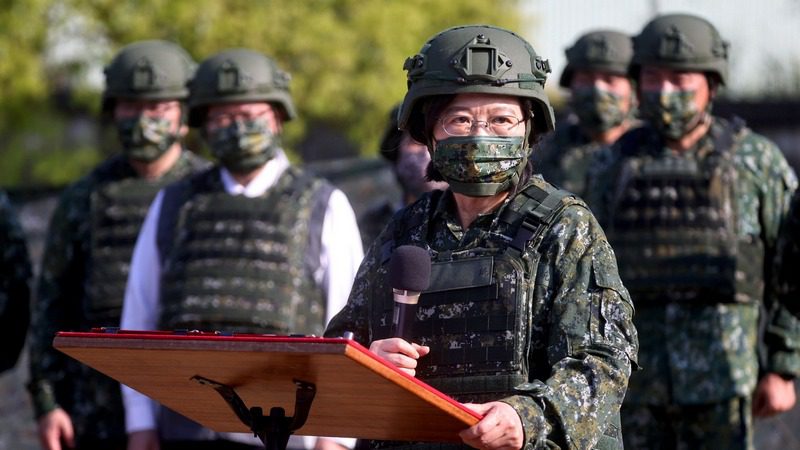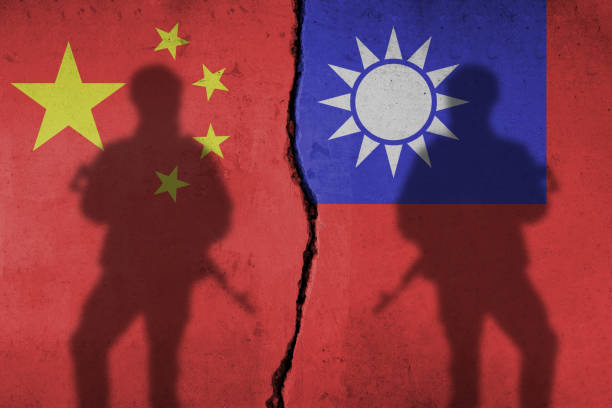After over three months of the war in Ukraine, the world seems to be preparing to witness another. This time, it is between two countries that are supposed to be one. China and Taiwan. Events of the past few weeks have suggested that both countries are ready for combat, and China is likely to strike first.
The latest of these events happened on Monday when China sent 30 warplanes into Taiwan’s territory. In defense, Taiwan deployed fighter jets to scare away the Chinese warplanes. Last week, China also held military drills around Taiwan after President Biden visited the region. A few days later, Taiwan also conducted missile testing to show its readiness for combat.
According to a statement released by China, the actions of the United States are mainly responsible for the drills.
“The US bad actions and tricks are completely futile and very dangerous. Those who play with fire will burn themselves”, the statement read.
These military exercises are coming after President Biden of the United States said his country will defend Taiwan militarily if China attempts to take over Taiwan by force. Read more
It is still unclear if the United States will send its military to defend Taiwan if China invades it. There are suggestions that President Biden might have made those comments ignorantly and that the United States will only send military support to Taiwan as it is doing in Ukraine.
ISSUES AFFECTING CHINA AND TAIWAN
The One-China Policy
Taiwan was part of China until 1949 when a civil war separated them. Since then, the Chinese communist government has had the belief that Taiwan will become part of China again, even if it means fighting to make it happen. China has also not ruled out the possibility of a diplomatic solution.
The One-China policy compels nations not to recognize the Taiwan government. Only the government in Beijing is the legitimate government, and Taiwan is a part of China in this policy. Countries that recognize Taiwan as an independent country do not have official relations with Beijing. Currently, 15 countries recognize Taiwan as an independent country, and these countries have no dealings with China. Successive U.S. presidents have sustained the one-China policy, including the current President.
“We agree with the ‘one-China policy. We signed on to it. All the attendant agreements [were] made from there. But the idea that it can be taken by force, just taken by force. It’s just not, it’s just not appropriate”, Joe Biden said in Tokyo. The U.S. government openly agrees with the policy, but at the same time, treats Taiwan as an independent country. This has not gone well with China.
Taiwan’s View of Itself
Taiwan does not see itself as part of China. Since its inception in 1949, the Island country has ruled itself independently. It has its flag, currency, and a President. Although it has not officially declared its independence, the small country does not see itself as part of China. Only a little more than 10% of Taiwanese want unification with China.
The country has done so well independently that it does not want to be a part of China. It is home to some of the biggest tech companies in the world. For a country that has been on its own for over 70 years, it will be difficult for it to agree to be a part of China, whether diplomatically or coercively.
The role of the U.S.
There is no way to talk about China and Taiwan’s relationship and not mention the United States. In 1979, the U.S. subscribed to the one-China policy. Despite that, the United States has another law that compels it to defend Taiwan. Under this act, the United States must help Taiwan defend itself. That is why the United States has continued to sell arms to Taiwan. Taiwan depends mainly on the U.S for arms supplies.
While Taiwan sees the United States as an ally, China does not see it as such. China believes the United States is meddling with its internal affairs. While reacting to Biden’s comments in Japan, the spokesperson of the Chinese foreign ministry, Wang Wenbin, said, “The Taiwan issue is a purely internal affair for China.” He added that “on issues touching on China’s core interests of the sovereignty and territorial integrity, China has no room for compromise or concession.”
He concluded by saying, “No one should underestimate the firm resolve, staunch will, and strong ability of the Chinese people in defending national sovereignty and territorial integrity.”
Whatever happens in Taiwan depends on the United States because China sees the U.S. as a threat more than Taiwan. If there are no threats from the U.S., the situation might calm down.
WHAT THE FUTURE HOLDS
Unless there is a change of government in China, it will be almost impossible for China to let go of Taiwan. Taiwan on the other hand does not have the arsenal to withstand the Chinese army. Taiwan’s military can only hold back the Russian army for a short period. Unlike the Chinese army which has over two million personnel, the Taiwan army has only 169,000 military personnel. Fighting China would be a risk.
Although the U.S. has always supplied arms to Taiwan, it is unlikely that Washington will want to fight against China. China has already accused the U.S. of using Taiwan to destabilize it.
No one can say at the moment what will happen in the future. Will Taiwan finally declare its independence? Will China invade Taiwan like Russia invaded Ukraine? If that happens, will the U.S. fight for the small country that depends on it for safety? Only the future can provide answers to these questions. The only certain thing is that the world is not ready for another war.


China and Taiwan












0 Comments